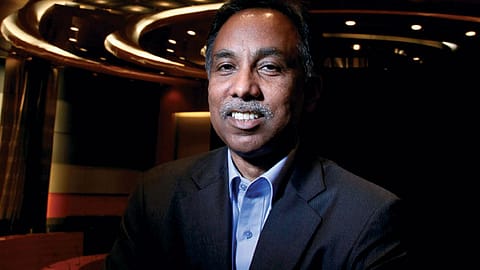Measurability extremely important in philanthropy: Infosys co-founder, S.D. Shibulal
How Infosys co-founder, S.D. Shibulal, is using business principles of scale, impact, and measurability in his philanthropic venture

When Infosys co-founder and former MD, S.D. Shibulal and his wife Kumari launched their philanthropic trust, Shibulal Family Philanthropic Initiatives (SFPI) way back in 1999, they were clear they wouldn’t do cheque-book philanthropy (which most foundations at that time did). They decided to roll up their sleeves and get involved in the causes they support. The SFPI which focuses mostly on education has till date given 26,000 scholarships to students from underprivileged backgrounds. Around 70-75% of the kids are from rural areas, 66% are girls. The foundation on an average spends ₹60,000 per year, per student for six years.
Like business, philanthropy also needs to have a clear-cut model, says Shibulal. Their focus from day-one has been on higher education. But why would one focus on higher education when the bulk of the students exit school in middle school itself? “Enrolment in primary education is close to 80% (it was just 17% in 1947), but higher education enrolments are below 30%. Most children despite being good at academics get pulled out for earning, so our primary objective was to prevent that. Our programme focuses primarily on affordability and awareness and a family whose annual income is below ₹2 lakh can’t afford ₹60,000 a year for education,” Shibulal explains.
SFPI invites applications every year and selects 1,600 students after a due diligence process. “After the 10th results are declared we put an ad in the local newspaper to invite applications. After we evaluate their marks and their financial certificates, we do an aptitude test, we call them for an interview and after that we do a home visit. Any child who joins our programme will be there with us for six years, we work with them till they finish their graduation or even post-graduation,” explains Kumari Shibulal, founder and chairperson SFPI.
Like the Shibulals, most new-age givers today are involved in the cause they are supporting. “Legacy wealth has moved into implementing wealth themselves. There is willingness to collaborate. They are willing to experiment, run their own projects, join an NGO and also join a collaborative. There is a lot more discussion around system change,” points out Neera Nundy, co-founder and partner, Dasra. A decade ago philanthropy was all about building a school or a hospital, unlike today when the philanthropists also want to ensure that the school or hospital is creating the desired impact.
“Measurability is extremely important in philanthropy. Our impact is visible as every child we work with, we know where they are,” points out Shibulal. SFPI regularly conducts impact studies. “Any child who goes through our programme gets a job and pulls the family out of poverty line in two-and-half-years. The transformation is not for the child alone, it’s for the family too.”
In the education sector, Shibulal says that while 80% of children in India have access to primary education, the outcome of the education is questionable. “Our goal is to bring about a systemic change and for that we realised that we needed to build capacity to improve the learning outcome. We realised we needed to work with teachers as the whole. The thinking was that if we improve the capacity of teachers that will improve learning outcomes,” he explains. Therefore in 2017, SFPI launched Shiksha Lokam where it has partnered with the Government to not just train teachers, but also build a leadership programme for school principals and other stakeholders. “You need to build capacity at the leadership level so that they can change the system,” he further explains.
Most philanthropists today are cause agnostic too. The Harish and Beena Shah Foundation which started with typical cheque book philanthropy 20 years ago, over the last decade has transitioned into more involved giving. “Our giving is not pledged to any sector or geography. We started with Dasra by supporting six of their giving circles and we found that each circle picked up a new topic. We decided to create a framework which would enable us to give agnostically. We were able to work with 50 nonprofits, we gave grants from as small as ₹10 lakh to multi crore funding,” explains Amira Shah Chhabra, Director, Harish and Beena Shah Foundation.
Recommended Stories
Chhabra says that the more her foundation worked across causes, they realised that a lot of it is inter-connected. “If you take education, it’s a classic learning that you need toilets for school and that leads you to supporting sanitation as well as menstrual hygiene. A lot of organisations are choosing employment, climate change etc and we are also considering a model where it is a location specific answer where you will have a multi-cause approach, but in a particular geography.”
SFPI is also supporting organic farming and paediatric cardiac care. Its latest initiative is ‘Sangamam’ launched with the purpose of reviving classical music. Though 80% of SFPI’s fund goes towards supporting higher education, it is also looking at primary education as an adjacency. “In 2004 I realised our programme will support children from Rs 2 lakh income households, but it won’t support a child whose family income is ₹50,000 a year. They need a lot more support. Therefore, we launched residential scholarships. We built schools (Samudha Academy in Bangalore and Coimbatore) and backward integrated this programme into the school,” says Shibulal.
The Infosys co-founder also believes in scaling up philanthropy. Shibulal’s scaling up formula is by creating partnerships. “We started converting our tech platform into a shared platform. We now invite people to sponsor a child. We can show you an 18-year-old, who you can groom, mentor and fund.” There are currently 6,000 students on the SFPI platform, of which 1,600 are sponsored by individuals and corporations. “I am hoping these kinds of partnerships will expand in the coming years,” says Shibulal.